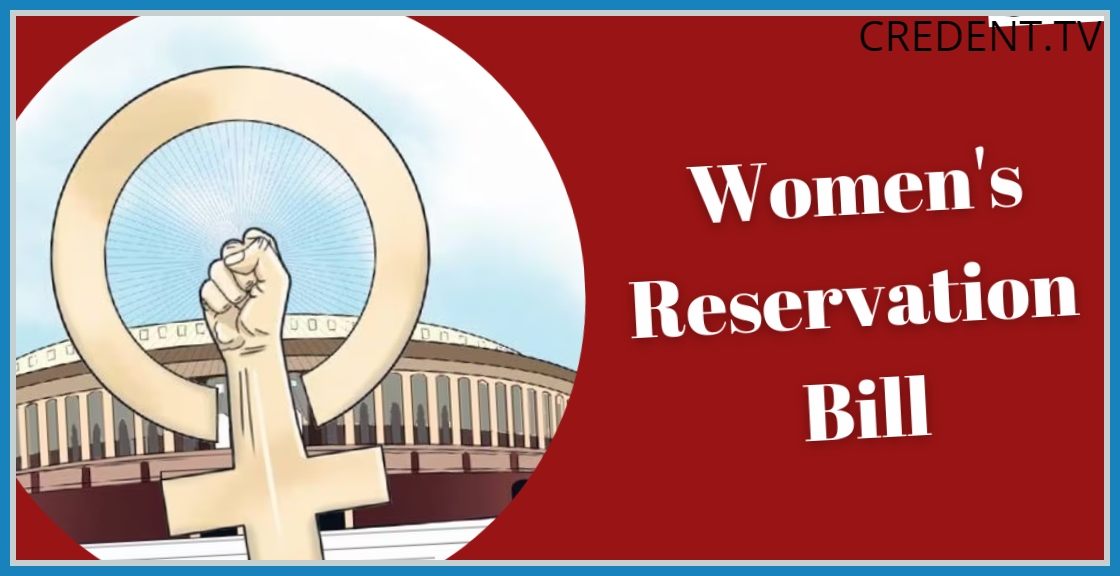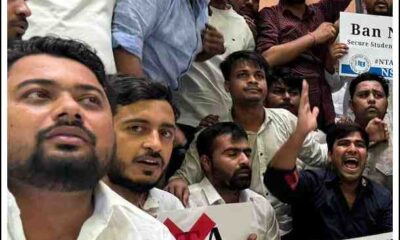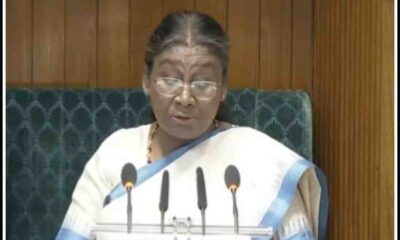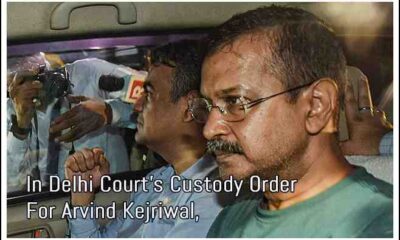ARTICLE
We want half of everything: half the house, half the farm, half the land, half the country, and half the Parliament
Published
9 months agoon

This was published in 2008. Since the implementation of women’s reservations on 33 percent of the seats in Gramme Panchayats, 15 years have passed
In this male-dominated environment, women who had hitherto lived in secrecy and behind closed doors found themselves unexpectedly in charge of the most significant administrative organisation in their community. Although there was no shortage of those who discreetly disapproved, it was more common to hear individuals asking, “What is the benefit of reservation?” Although a lady appears to be in the photo, all the work is done by guys.
The Madhya Pradesh state capital was bustling with women on that particular day in July 2008. In Bhopal, a gathering of village leaders was taking place. Women who were members of panchayats and village chiefs travelled from all across the state to experience the capital’s roadways for the first time. Many of them were in a situation where it was their first time riding in a train. For the first time, she had left her village. She was taken aback when she first laid eyes on such a huge lake, vast roadways, and the automobiles travelling along those routes.
What has changed since women received reservations, a journalist who was in attendance at the programme asked a female village head that day. Instead of responding verbally, the woman knit a lengthy veil that reached her chest before removing it all at once. This is retaliation, she murmured as she took it up.
The woman lowering her veil and wearing a purple cotton saree with orange vermillion applied to her forehead seemed like a scene from a movie. You have travelled so far from the village alone, the journalist inquired, transfixed by the scene. You don’t experience fear.
No, madam, I don’t have that knife, the woman replied as she pulled one out of her bag. It was a kitchen knife used for chopping vegetables, but the woman had turned it into a sword for protection. Even at times when her husband’s voice was loud, her tongue would shake. She had grown so self-assured today that she was now able to travel to a distant city while carrying a knife.
So, in 15 years, this was altered with reservations.
The 19th of September 2023 marked a pivotal moment in Indian legislative politics. No other law has ever been delayed for as long as the Women’s Reservation law did in the history of the Parliament of this nation, which holds itself out as the global and democratic leader. According to UN Women data that is released annually, our neighbours Pakistan and Bangladesh have likewise advanced past us in terms of women’s participation in parliamentary politics.
We would work to surpass these nations in every area while ignoring the issue of why there are so few women in our country’s parliament. Even with increased efforts, the situation was only moving forward by 13–14%.
Everyone agreed during the remarks that this number should rise, but as soon as the issue of granting women in Parliament a reservation was brought up to put this emotion into practise, everyone turned away.
There would appear to be such a long number of terms and conditions that the mutual fund’s terms and conditions documents would shrink in size.
Read also:-Supreme Court on Muslim Boy Slapped At UP School: “Should Shock Conscience”
In contrast to the Reservation Bill, which was originally introduced in 1996 by the Deve Gowda-led United Front government, the topic of boosting women’s participation in politics was first brought up in Parliament 45 years before, in 1974.
After that, this law was introduced into Parliament at least ten times, but each time it was blocked by demonstrations, outrage, and cries for change. Sometimes someone tore the bill in rage, other times someone stood on the speaker’s platform and shouted, and other times a fight even broke out in the House of Commons. Only Parkatti women will gain from this bill, according to Sharad Yadav.
On September 19, history was made since, after a long wait of 27 years, this hope was finally realised.
The likelihood of this bill becoming law, though, is still remote. According to the government’s phrasing, it appears that the publisher has agreed to print the book, but the forest should be identified before any trees are cut down to manufacture the paper that will be used to print the book. Where in the forest is the tree?
It might be wiser to hold off a little bit longer as we have waited 45 years for this day. With the introduction of this measure, all those issues that have occasionally dominated prime time debates on news channels for the past 20 years have once more gained attention.
Will women actually gain from reservations?
When this bill was approved by the Rajya Sabha in 2010, Karan Thapar was participating in a prime time debate with Manish Tewari, Subhashini Ali, and Zoya Hassan. The main topic of discussion was whether it was appropriate to offer reservations in favour of women’s empowerment.
The same question is currently being posed by our newsroom coworkers, uncles in WhatsApp chats, and even the males gathered at the neighbourhood tea shop. Women assert that they are equal to males on the one hand, and they also want to be treated equally with men on the other.
The claim that even with reservations, only the wives, sisters, mothers, and other relatives of the current leaders will attend Parliament is the most lethal arrow to emerge from the quiver of justifications offered in opposition and defence. As has been stated in the context of Panchayat, common women will not have a chance, and the irony is that this is not entirely untrue.
The truth is not exactly what is said or how it is presented. The truth also has a second aspect. The fact is that, with the exception of Britain, every nation in the world has implemented some type of reservation to boost the representation of women in parliament.
The Labour Party of Tony Blair was unanimously elected to power in Britain in 1997, with the most women ever elected to that position. This was due to Tony Blair’s vision, which included offering women numerous chances, integrating them into the party, running them in elections, etc. In addition, unlike our country, that nation’s political structure only consisted of the two main parties.
In addition to this, the parliaments of the Nordic nations (Sweden, Finland, Norway, Denmark, Iceland), the Netherlands, France, Germany, Spain, Rwanda, and Cuba all initially allocated a specific proportion of seats for women. The conditions of women’s lives on the ground changed significantly as a result of their participation in politics.
In a society like India, where caste, social, and gender inequality have such deep roots, the same justification for social justice that has been presented for caste reservation also applies to women’s reservations. will be equal, but the race’s starting line need to be as well. It will be necessary to provide a specific opportunity to the woman who has been denied the right to knowledge, education, employment, and property for generations.
The second point is that, similar to caste, all women in the nation do not constitute a single group. Different castes, faiths, and groups have different divisions of women. This is true, but it’s also true that women have a lower social position than men across all castes, faiths, and groups. Due to this reality, a caste reservation clause has been included to the women’s reservation.
Despite all of this, it’s probable that only women from wealthy political families will initially benefit from reservations, but in the long run, these reservations might significantly change the social and political position of those women.
Everything about the politics and makeup of the Parliament will alter as a result of the 181 women who currently serve in it. Women from non-political households will also be able to enter Parliament, and this will have an effect on society as a whole.
Even the village headwoman’s husband attends and participates in village Panchayat meetings, but this will not occur in the Parliament. Only the elected female MP will enter the House. She will join in the discussions, ask questions, and participate.
Even the most powerful feudal lord cannot prevent the repercussions of these concrete changes from reverberating throughout society. Like the Bhopal village chief woman who raised her veil in 2008 to declare, “This has changed.” Similar to this, the long-term bias for significant socio-cultural changes will result from the introduction of women into Parliament.
Women will then inquire as to why there are only 33% of us in Parliament given that we make up 50% of the population. We require the entire half. Half a house, a farm, a piece of land, the nation, and the Parliament.
You may like
-


North Korea asserts that the test of a multiple-warhead missile was successful
-


The Student Wing of Congress storms the Exam Body NTA office and locks it from within
-


“During President Murmu’s address to Parliament, PM Modi was shown 73 times, and LoP Rahul Gandhi was shown six times”: Congress
-


NASA contracts Elon Musk’s SpaceX to deorbit the International Space Station in 2023.
-


A Caution For The CBI In The Delhi Court’s Arvind Kejriwal Custody Order
-


Bar Council of India requests that bar associations abstain from demonstrating in opposition to new criminal laws
